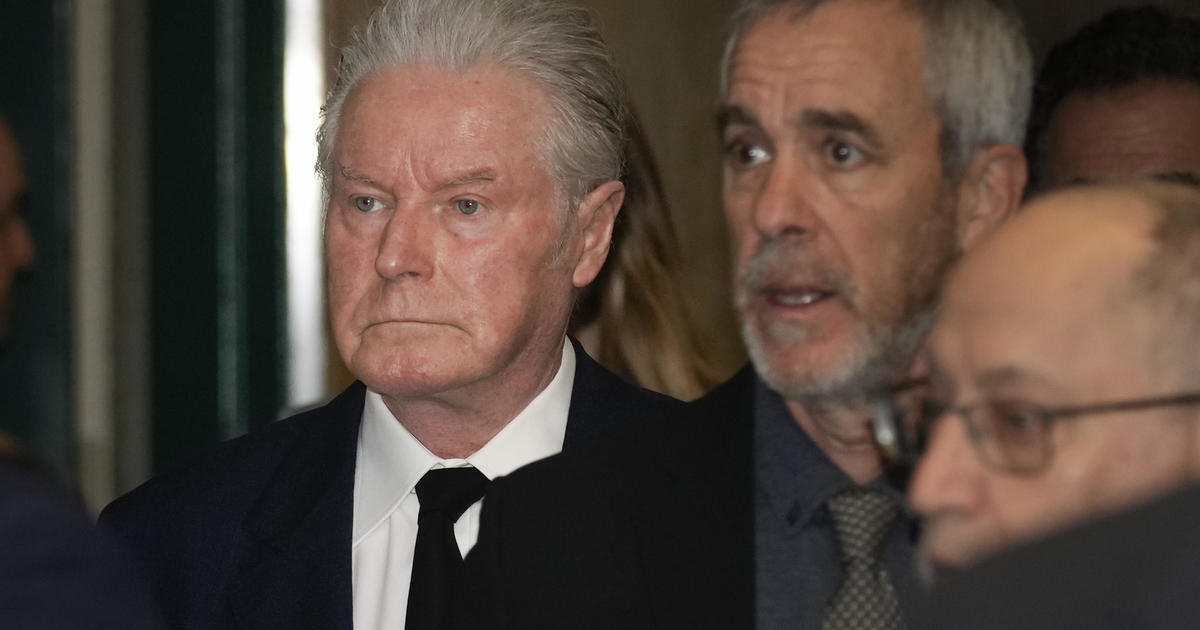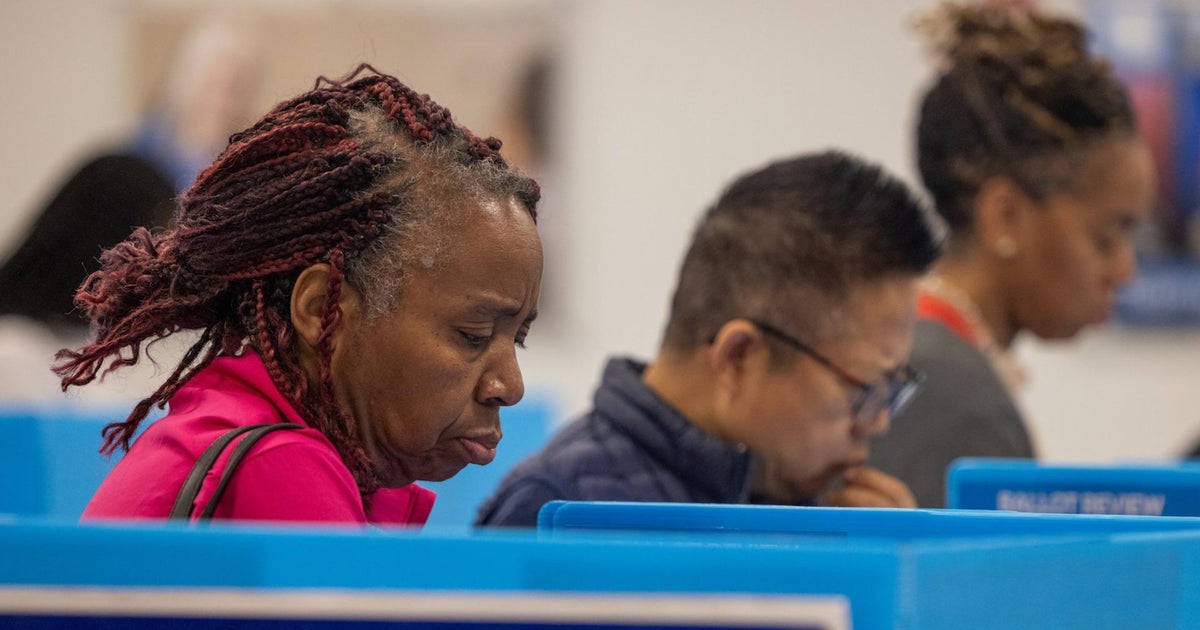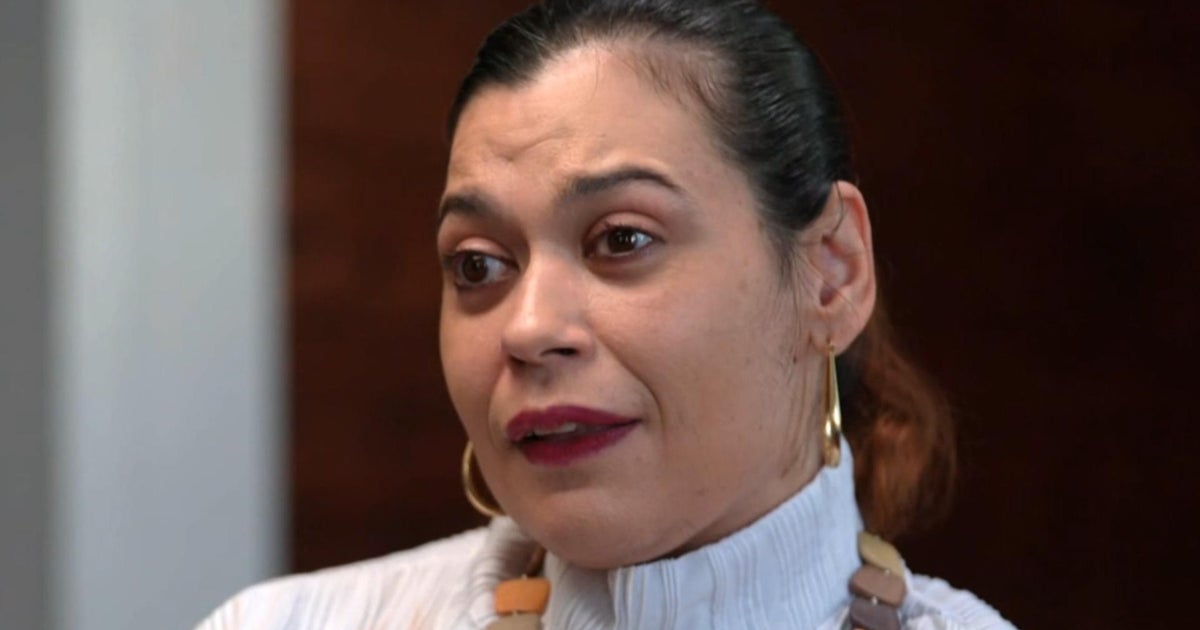CBS News
Don Henley says he “never gifted” lyrics to “Hotel California” and other Eagles songs

The lyrics to “Hotel California” and other classic Eagles songs should never have ended up at auction, Don Henley told a court Wednesday.
“I always knew those lyrics were my property. I never gifted them or gave them to anybody to keep or sell,” the Eagles co-founder said on the last of three days of testimony at the trial of three collectibles experts charged with a scheme to peddle roughly 100 handwritten pages of the lyrics.
On trial are rare-book dealer Glenn Horowitz and rock memorabilia connoisseurs Craig Inciardi and Edward Kosinski. Prosecutors say the three circulated bogus stories about the documents’ ownership history in order to try to sell them and parry Henley’s demands for them.
Seth Wenig / AP
Kosinski, Inciardi and Horowitz have pleaded not guilty to charges that include conspiracy to criminally possess stolen property.
Defense lawyers say the men rightfully owned and were free to sell the documents, which they acquired through a writer who worked on a never-published Eagles biography decades ago.
The lyrics sheets document the shaping of a roster of 1970s rock hits, many of them from one of the best-selling albums of all time: the Eagles’ “Hotel California.”
“CBS Mornings” co-host Gayle King asked Henley in 2016 about the meaning of “Hotel California.”
“Well, I always say, it’s a journey from innocence to experience. It’s not really about California; it’s about America,” Henley said. “It’s about the dark underbelly of the American dream. It’s about excess, it’s about narcissism. It’s about the music business. It’s about a lot of different. … It can have a million interpretations.”
The case centers on how the legal-pad pages made their way from Henley’s Southern California barn to the biographer’s home in New York’s Hudson Valley, and then to the defendants in New York City.
The defense argues that Henley gave the lyrics drafts to the writer, Ed Sanders. Henley says that he invited Sanders to review the pages for research but that the writer was obligated to relinquish them.
In a series of rapid-fire questions, prosecutor Aaron Ginandes asked Henley who owned the papers at every stage from when he bought the pads at a Los Angeles stationery store to when they cropped up at auctions.
“I did,” Henley answered each time.
Sanders isn’t charged with any crime and hasn’t responded to messages seeking comment on the case. He sold the pages to Horowitz. Inciardi and Kosinski bought them from the book dealer, then started putting some sheets up for auction in 2012.
“I wonder how these comments will age”
While the trial is about the lyrics sheets, the fate of another set of pages – Sanders’ decades-old biography manuscript – has come up repeatedly as prosecutors and defense lawyers examined his interactions with Henley, Eagles co-founder Glenn Frey and Eagles representatives.
Work on the authorized book began in 1979 and spanned the band’s breakup the next year. (The Eagles regrouped in 1994.)
Henley testified earlier this week that he was disappointed in an initial draft of 100 pages of the manuscript in 1980. Revisions apparently softened his view somewhat.
By 1983, he wrote to Sanders that the latest draft “flows well and is very humorous up until the end,” according to a letter shown in court Wednesday.
But the letter went on to muse about whether it might be better for Henley and Frey just to “send each other these bitter pages and let the book end on a slightly gentler note?”
“I wonder how these comments will age,” Henley wrote. “Still, I think the book has merit and should be published.”
It never was. Eagles manager Irving Azoff testified last week that publishers made no offers, that the book never got the band’s OK and that he believed Frey ultimately nixed the project. Frey died in 2016.
The defense also has questioned how clearly Henley remembers whatever he told Sanders during the book project, which spanned a tumultuous and fast-living time for Henley.
When the Eagles initially broke up in 1980, Henley was arrested that year after authorities said they found a 16-year-old girl naked and suffering from a drug overdose in his Los Angeles home. He was sentenced to probation and a $2,500 fine after pleading no contest to a misdemeanor charge of contributing to the delinquency of a minor.
Asked whether he had been using “a significant amount of cocaine” before his arrest, Henley replied: “Significant?”
“You know, ‘sex, drugs and rock ‘n’ roll’ is not revelatory,” he said.
He said he used cocaine “intermittently” throughout the 1970s but he was always lucid when performing or doing business.
“If I was some sort of a drug-filled zombie, I couldn’t have accomplished everything I accomplished before 1980 and after 1980,” Henley said.
In his 2016 interview with Gayle King, Henley said the band was indeed living “life in the fast lane” in the 1970s.
“Yeah… Everybody was doing it. It was the ’70s,” Henley said. “It was what everybody was doing, which doesn’t make it right necessarily. And you know, looking back on it, there’s some regrets about that. We probably could have been more productive … although we were pretty productive, considering.”
The trial is expected to continue for weeks with other witnesses.
Henley, meanwhile, is returning to the road. The Eagles’ next show is Friday in Hollywood, Florida.
CBS News
The Plot to Eliminate Alyssa Burkett

Watch CBS News
Be the first to know
Get browser notifications for breaking news, live events, and exclusive reporting.
CBS News
How to watch the Jacksonville Jaguars vs. Detroit Lions game today: Livestream options, more

Getty Images
It will be the Jacksonville Jaguars against the Detroit Lions in a game today. The game will be played at Ford Field in Detroit. The Jaguars will be looking to snap a three-game losing streak, coming into the game with a record of just 2-8. The Lions, meanwhile, have just lost once so far this season for an overall resume of 8-1. Their single loss this season was to the Tampa Bay Buccaneers in September.
Keep reading to find out how and when to watch the Jacksonville Jaguars vs. Detroit Lions game today, even if you don’t have cable.
CBS, Paramount+ and CBS Essentials are all subsidiaries of Paramount Global.
How and when to watch the Jacksonville Jaguars vs. Detroit Lions game today
The Jacksonville Jaguars vs. Detroit Lions game will be played on Sunday, November 17, 2024 at 1:00 p.m. ET (10:00 a.m. PT). The NFL football game will air on CBS and stream on Paramount+ and the platforms featured below.
How and when to watch the Jacksonville Jaguars vs. Detroit Lions game without cable
While CBS is available with many basic cable packages, you don’t need to worry if you don’t have access. Whether you have cable or have completely cut the cord, the game will be available with a variety of other options. Just note that the below streaming options will require the use of an internet provider:
Paramount+: Watch CBS-aired NFL games without cable
With Paramount+ you’ll have multiple viewing options to choose from. You can catch NFL games on the Paramount+ Essential tier for just $7.99 each month or you can watch college football with a Paramount+ with Showtime subscription for $12.99 monthly. In addition to live streams of NFL games airing on CBS, you’ll get to watch additional live sporting events including NCAA college football, PGA Tour golf, soccer and more.
Get started with Paramount+ here today.
Amazon Prime Video: Add Paramount+ to your existing subscription
Already have an Amazon Prime Video account? Simply add Paramount+ to your current subscription to watch all the CBS-aired NFL games in addition to Paramount+ originals. The same prices from above apply, depending on which tier you choose. Not sure which is best for you? Don’t worry. Both options come with a free seven-day trial that can help you decide.
Watch the Jaguars-Lions game on Amazon Prime Video.
Fubo: Watch the Jaguars-Lions game for free
If you’re looking for an inexpensive way to watch a variety of football games, Fubo could be the best way to do so. The live TV streamer is currently offering a seven-day free trial and $30 off of your first month’s subscription. Once subscribed, you’ll gain access to all of their live sporting events immediately. And there will be a lot to choose from. Not only does Fubo come with access to NFL games airing on your local CBS channel, it also includes Fox Sunday NFC games, “Sunday Night Football” on NBC, “Monday Night Football” on ABC and ESPN and all of the games that air on the NFL Network. So don’t wait.
Get started with Fubo online now.
As the football season ramps up you may want to stock up on the latest NFL gear and merchandise. Fanatics is a great way to do so. With the latest player t-shirts, jerseys, hoodies and more, there’s plenty of stuff in stock to keep you covered this season. But don’t wait much longer. As each week in the season passes by competition for this limited merchandise will increase. Don’t wait for it to sell out.
Head over to Fanatics now to check out the latest NFL fan gear drop.
CBS News
How to watch the Minnesota Vikings vs. Tennessee Titans game today: Livestream options, more

Getty Images
The Minnesota Vikings will take on the Tennessee Titans in a game today at the Nissan Stadium in Nashville. The Vikings are riding a two-game winning streak for an overall record of 7-2 this season. But the Titans have underperformed so far this season, coming into the game off a loss to the Los Angeles Chargers on November 10. Their overall record right now is the opposite of the Vikings at 2-7.
Keep reading to find out how and when to watch the Minnesota Vikings vs. Tennessee Titans game today, even if you don’t have cable.
CBS, Paramount+ and CBS Essentials are all subsidiaries of Paramount Global.
How and when to watch the Minnesota Vikings vs. Tennessee Titans game today
The Minnesota Vikings vs. Tennessee Titans game will be played on Sunday, November 17, 2024 at 1:00 p.m. ET (10:00 a.m. PT). The NFL football game will air on CBS and stream on Paramount+ and the platforms featured below.
How and when to watch the Minnesota Vikings vs. Tennessee Titans game without cable
While CBS is available with many basic cable packages, you don’t need to worry if you don’t have access. Whether you have cable or have completely cut the cord, the game will be available with a variety of other options. Just note that the below streaming options will require the use of an internet provider:
Paramount+: Watch CBS-aired NFL games without cable
With Paramount+ you’ll have multiple viewing options to choose from. You can catch NFL games on the Paramount+ Essential tier for just $7.99 each month or you can watch college football with a Paramount+ with Showtime subscription for $12.99 monthly. In addition to live streams of NFL games airing on CBS, you’ll get to watch additional live sporting events including NCAA college football, PGA Tour golf, soccer and more.
Get started with Paramount+ here today.
Amazon Prime Video: Add Paramount+ to your existing subscription
Already have an Amazon Prime Video account? Simply add Paramount+ to your current subscription to watch all the CBS-aired NFL games in addition to Paramount+ originals. The same prices from above apply, depending on which tier you choose. Not sure which is best for you? Don’t worry. Both options come with a free seven-day trial that can help you decide.
Watch the Vikings-Titans game on Amazon Prime Video.
Fubo: Watch the Vikings-Titans game for free
If you’re looking for an inexpensive way to watch a variety of football games, Fubo could be the best way to do so. The live TV streamer is currently offering a seven-day free trial and $30 off of your first month’s subscription. Once subscribed, you’ll gain access to all of their live sporting events immediately. And there will be a lot to choose from. Not only does Fubo come with access to NFL games airing on your local CBS channel, it also includes Fox Sunday NFC games, “Sunday Night Football” on NBC, “Monday Night Football” on ABC and ESPN and all of the games that air on the NFL Network. So don’t wait.
Get started with Fubo online now.
As the football season ramps up you may want to stock up on the latest NFL gear and merchandise. Fanatics is a great way to do so. With the latest player t-shirts, jerseys, hoodies and more, there’s plenty of stuff in stock to keep you covered this season. But don’t wait much longer. As each week in the season passes by competition for this limited merchandise will increase. Don’t wait for it to sell out.
Head over to Fanatics now to check out the latest NFL fan gear drop.










